Legislature Refuses to Change Absentee Vote Counting Law
This past election shows why election officials want to count absentee votes early.
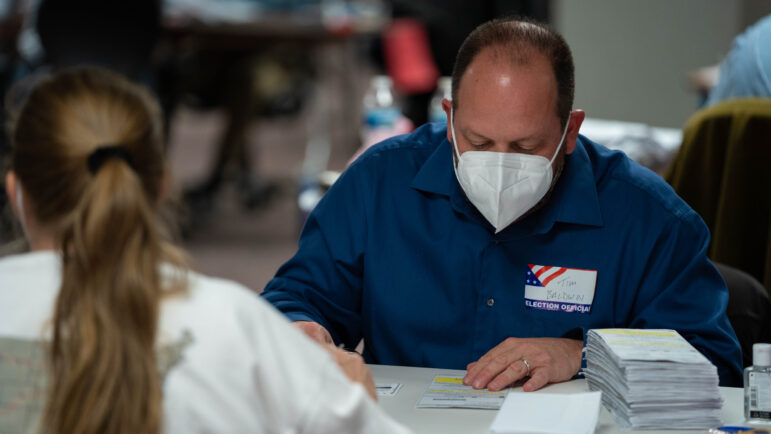
Election workers count ballots at the Milwaukee Central Count location after the polls had closed for the evening on Nov. 3, 2020. Bipartisan proposals in the state Legislature would have allowed clerks to process absentee ballots before Election Day, allowing for quicker final tallies. But those measures so far have failed to gain traction. Eric Kleppe-Montenegro for Wisconsin Watch
This article is made possible through Votebeat, a nonpartisan reporting project covering local election integrity and voting access.
As Claire Woodall-Vogg stood in the middle of an empty Central Count facility days before the Nov. 3 election, it wasn’t just the national spotlight on the city of Milwaukee or the swirling claims of voter fraud that weighed heavily on her mind. It was the frustration that she, and hundreds of other Milwaukee election workers, were facing an unprecedented pile of absentee ballots — and no permission to process them.
For years, Woodall-Vogg, executive director of the Milwaukee Election Commission, and other election officials have pushed for absentee vote processing to start before Election Day. While momentum on this front has built since 2008, with two pieces of legislation proposed in the last legislative session alone, Wisconsin still bars workers from opening absentee ballots before an election.
“I get pretty frustrated by it and pretty angry that we’re being forced to risk our own health,” Woodall-Vogg said, her voice straining as she explained that more than 400 election workers would take shifts counting absentee ballots until all were tabulated.

Claire Woodall-Vogg, executive director of the Milwaukee Election Commission, speaks on the phone from her office at City Hall during the partisan primary on Aug. 11, 2020. Woodall-Vogg favors legislation that would help clerks process absentee ballots before Election Day. Will Cioci / Wisconsin Watch
Woodall-Vogg had hoped workers would have more time to process absentee ballots, so they wouldn’t have to work around the clock in the enclosed Central Count space on Election Day.
Earlier processing also would have allowed Wisconsin to avoid unwarranted charges by President Donald Trump and his allies of middle-of-the-night “dumps” of absentee ballots that in most places tended to favor former Vice President Joe Biden.
The procedures for processing ballots before they are counted differ from state to state. It often includes opening envelopes and flattening ballots, or matching voter signatures to state records. Wisconsin doesn’t have a signature match requirement.
The speed at which machines can tabulate ballots depends on how well they’re prepared, Woodall-Vogg said. The tabulators at Milwaukee’s Central Count can sort 2,000 ballots an hour at top speed, but as few as 1,200 if ballots are crumpled up. If workers aren’t allowed to open the ballots before Election Day, they don’t have as much time to smooth them out, which contributes to more machine jams, she said.
“It’s the simplest thing and the most common sense change to a law that our Legislature has refused to take any action on,” Woodall-Vogg said.
Bills proposed — then die
Some lawmakers were poised to act even before the pandemic prompted an unprecedented 59% of Wisconsinites who voted to cast absentee ballots in the general election — a massive increase over previous elections.
A bipartisan bill proposed by Sen. Devin LeMahieu, R-Oostburg, in November 2019 would have made it possible for municipalities to begin processing absentee ballots on the day before an election. The bill failed to pass before the end of the session. In mid-October, nearly two dozen Democratic lawmakers sent a letter to Assembly Speaker Robin Vos, R-Rochester, and Senate Majority Leader Scott Fitzgerald, R-Juneau, urging them to pass the bill.
“Election integrity is of utmost concern for voters in Wisconsin,” the lawmakers wrote, “and the longer the count takes, the more potential for mistrust in results to be fomented by those who mean harm to our democracy.”
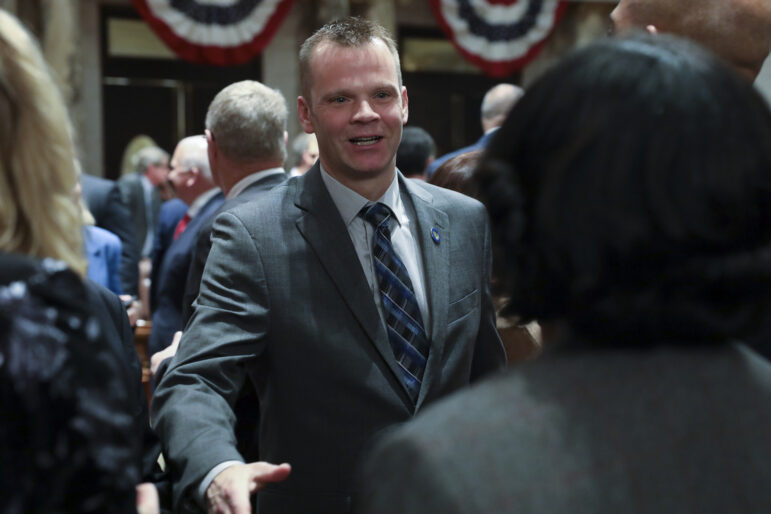
Sen. Devin LeMahieu, R-Oostburg, is seen at Gov. Tony Evers’ State of the State address at the State Capitol on Jan. 22, 2020 in Madison, Wis. LeMahieu has authored legislation to allow clerks to begin processing absentee ballots the day before Election Day to speed up final results. Coburn Dukehart / Wisconsin Watch
After the November election, LeMahieu replaced Scott Fitzgerald as Senate majority leader. He declined an interview request from Wisconsin Watch.
But at a Jan. 15 hearing, he asked his colleagues to pass the bill. His argument was familiar: If results are reported in a timely manner, the public may have more confidence in the outcome.
Other lawmakers agree that late-arriving results, such as in Milwaukee during the general election, spur a swirl of disinformation. As workers in Milwaukee’s Central Count continued to process ballots into Wednesday morning, Trump had already inaccurately declared victory.
By the time approximately 169,000 absentee ballots from Milwaukee were all counted — pushing Biden’s statewide totals above Trump’s — it was 4 a.m. The morning following the election, Trump tweeted that “surprise ballot dumps” had cost him the lead in several key states.
Late results common in Wisconsin
Although the late-night release of absentee ballots attracted a whirlwind of attention this year, it was not unusual. Kevin Kennedy, Wisconsin’s chief election official for more than 30 years, recalls working the 2018 election when Gov. Tony Evers challenged then-Gov. Scott Walker.
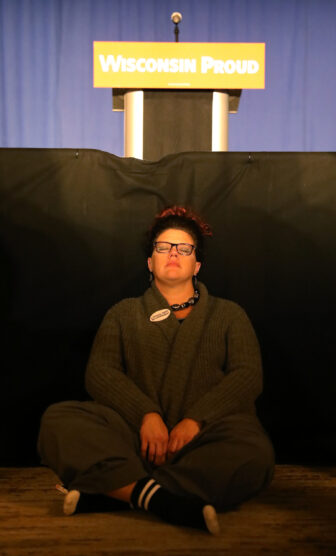
Paula Lindner from Racine, Wis., waits for results of the gubernatorial race near the end of the watch party for Gov. Scott Walker around 12:20 a.m., at the Ingleside Hotel in Pewaukee, Wis., on Nov. 7, 2018. Wisconsin bars election officials from processing absentee ballots until the day of the election, which means results often come in late in the evening or the following day. Coburn Dukehart / Wisconsin Watch
“I remember turning out the lights after coming home from the polls where I worked, thinking that Walker had won,” Kennedy said. When he woke up that morning, he checked his phone and saw Evers had pulled ahead overnight. “I slapped my head and said, ‘Of course … Milwaukee!’ ”
The effort to count absentee ballots earlier has gained bipartisan support across the state over time, with some groups emphasizing the relief it would provide for election workers and others highlighting how it could improve voters’ confidence in results.
Another 2019 measure, Senate Bill 193, would allow in-person absentee voters to place their ballots directly into an electronic voting machine at clerks’ offices.
“Under this process, there is increased security and transparency built in,” wrote Rep. Janel Brandtjen, R-Menomonee Falls, in testimony supporting the bill. “Voters feel comfortable feeding their own ballot into the machine and will be more confident that their vote will be counted.”
These measures prompted the Wisconsin Elections Commission to comment on how procedures across the state would change if they were enacted.
One significant difference would be the treatment of ballots cast by voters who died before Election Day. Those ballots currently are not counted but would be if Senate Bill 193 were adopted, according to a memo by commission Administrator Meagan Wolfe. She also outlined how the commission would certify results from municipalities that opt to count ballots before Election Day, including how tabulators would be checked for safety and accuracy.
In a late September interview with WISN-TV’s Adrienne Pedersen, Republican U.S. Sen. Ron Johnson said he favors legislation that would change when workers can process absentee ballots.
“I would also suggest we change the law so that election officials can start opening and counting those ballots well before Election Day,” Johnson said, adding that he did not want Wisconsin to be “part of the problem,” in delaying an election result.
Absentee ballot use skyrockets
The use of absentee ballots has increased dramatically since 2000, when the Legislature removed the requirement that voters must state a reason for requesting an absentee ballot.
Momentum built especially after the 2008 election, Kennedy said, when the challenges were so numerous that election officials began entertaining alternatives to state procedures, such as processing absentee ballots earlier. These were outlined in a report from the Wisconsin Government Accountability Board, which was replaced in 2016 by the Wisconsin Elections Commission.
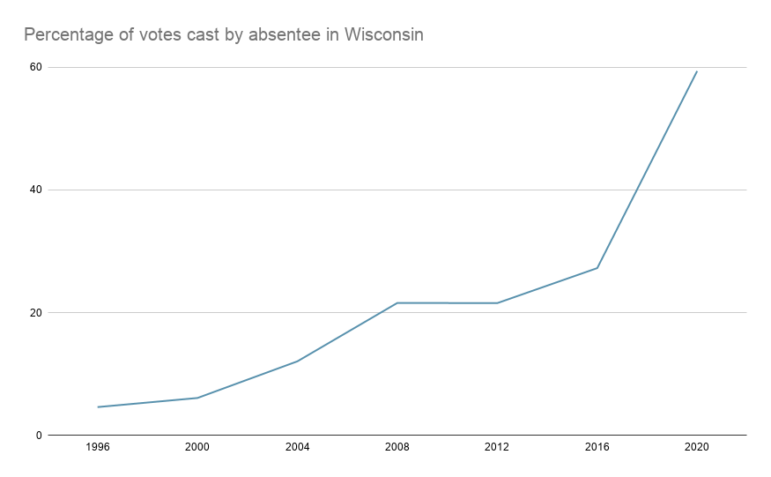
Wisconsinites increasingly prefer to cast their ballots early through in-person absentee voting or mail-in absentee voting. Source: Wisconsin Elections Commission. Nora Eckert / Wisconsin Watch
The report states “election administrators felt overwhelmed with managing in-person absentee applications and ballot logs before Election Day, while voters complained of long lines at in-person absentee voting sites.” The board proposed allowing absentee voters to place their ballots directly into a tabulator as a solution.
After reaching out to legislative leaders and the governor in March, Milwaukee Mayor Tom Barrett wondered what could spark action. The Legislature hasn’t cast votes since its April meeting.
“When you hear the leadership in the Legislature talk about local control, what we’re seeing is the farthest thing in the world from local control, as it pertains to the counting of the ballots in this election,” Barrett said.
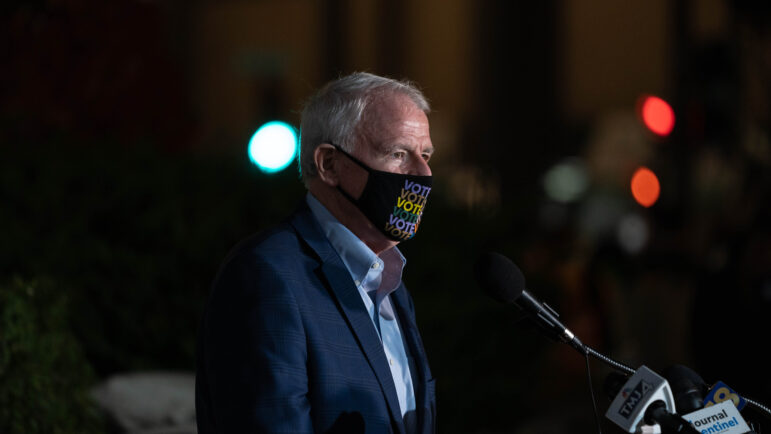
Milwaukee Mayor Tom Barrett speaks outside of the city’s Central Count location after the polls had closed for the evening on Nov. 3, 2020. Barrett favors allowing election officials to process absentee ballots before Election Day. Eric Kleppe-Montenegro for Wisconsin Watch
In public hearings on LeMahieu’s bill, presenters discussed details of how the current process could be altered and how municipalities in the state would adapt to different rules. Disagreement over these details, and a general reluctance to amend any aspect of the elections process, has kept legislative change at bay.
Yet it’s possible the lessons learned from this election could prompt future legislation — especially as absentee voting will likely remain popular, he said.
However, he said there is another possible outcome. Lawmakers may impose more restrictions on absentee voting, citing concerns about fraud, such as those laid out in the Trump campaign’s recount petition. Studies show fraud is exceedingly rare in Wisconsin — and around the United States
“Do we make it easier on the election officials? Or do we make it harder on the voters?” Kennedy said. “That will be the tension that we’re balancing.”
The nonprofit Wisconsin Watch (wisconsinwatch.org) collaborates with WPR, PBS Wisconsin, other news media and the University of Wisconsin-Madison School of Journalism and Mass Communication. All works created, published, posted or disseminated by Wisconsin Watch do not necessarily reflect the views or opinions of UW-Madison or any of its affiliates.
More about the 2020 General Election
- Senator Agard Statement on Senator Knodl’s Continued Relitigation of the 2020 Presidential Election - Dane County Executive Melissa Agard - Aug 29th, 2023
- Report Calls For Criminally Charging State’s Fake Electors - Henry Redman - Dec 19th, 2022
- Vos Withdraws Subpoenas, Ends Gableman Probe - Henry Redman - Aug 30th, 2022
- Judge Blasts Gableman Probe, Deleted Records - Henry Redman - Aug 17th, 2022
- Vos Fires Gableman, Ends Election Probe - Shawn Johnson - Aug 14th, 2022
- Judge Orders Gableman To Pay $163,000 In Legal Fees - Rich Kremer - Aug 2nd, 2022
- Prosecute 2020 Fake Electors, Advocates Demand - Erik Gunn - Aug 1st, 2022
- Trump Calls For Nullification of Wisconsin’s 2020 Election - Henry Redman - Jul 12th, 2022
- Legal Fight Over Gableman Probe Keeps Growing - Shawn Johnson - Jun 30th, 2022
- Back In the News: Fake Elector Scheme Dogs Ron Johnson - Bruce Murphy - Jun 28th, 2022
Read more about 2020 General Election here
More about the Presidential Recount
- Legislature Refuses to Change Absentee Vote Counting Law - Nora Eckert - Dec 5th, 2020
- Supervisor Martin Thanks Election Commission for Successfully Completing the Recount - Sup. Felesia Martin - Dec 2nd, 2020
- State Elections Commission Gets Testy - Jeramey Jannene - Dec 1st, 2020
- State Declares Biden Won Election - Graham Kilmer - Nov 30th, 2020
- Recount Reaffirms that Wisconsin Voters Picked Joe Biden - A Better Wisconsin Together - Nov 30th, 2020
- AG Kaul Issues Statement on Completion of Partial Recount in Wisconsin - Josh Kaul - Nov 30th, 2020
- Wisconsin Recount Grows Biden’s Margin, But Trump Says Fight Isn’t Over - Jeramey Jannene - Nov 29th, 2020
- Trump Promises Lawsuit Challenging Wisconsin Election Results - Jeramey Jannene - Nov 29th, 2020
- Milwaukee County Completes Recount - George Christenson - Nov 27th, 2020
- Milwaukee County Recount Finished, Dane County Continuing - Jeramey Jannene - Nov 27th, 2020
Read more about Presidential Recount here
-
Legislators Agree on Postpartum Medicaid Expansion
 Jan 22nd, 2025 by Hallie Claflin
Jan 22nd, 2025 by Hallie Claflin
-
Inferior Care Feared As Counties Privatize Nursing Homes
 Dec 15th, 2024 by Addie Costello
Dec 15th, 2024 by Addie Costello
-
Wisconsin Lacks Clear System for Tracking Police Caught Lying
 May 9th, 2024 by Jacob Resneck
May 9th, 2024 by Jacob Resneck






















This article shows that even when some Republicans come up with some good legislative proposals based that would help increase the confidence of the public in elections, the leadership deliberately sabotages it. There is an element in the Republican Party that seeks to create confusion among the voters on most issues. They have continually shown their inability to pass legislation for the good of the State. Confusion and frustration helps mask their actions towards concentrating their political power through voter suppression and gerrymandering.